MEDNEWS 01/2020

by Gaetano Leone, Coordinator, UNEP/MAP — Barcelona Convention Secretariat
Could the Naples Ministerial Declaration usher in a new deal for the Mediterranean?
Words matter, especially when they are committed to paper at the intergovernmental meeting of ministers and senior officials representing 21 Mediterranean countries and the European Union.
The 21st Meeting of the Contracting Parties (COP 21) to the Barcelona Convention and its Protocols adopted a host of decisions aiming to address the plight of Mediterranean ecosystems found to be reeling under the combined pressure of the unsustainable pursuit of growth and climate change. Negotiating and adopting decisions is in itself an ambitious process, but this time the Contracting Parties went further in expressing their concern about the ever more evident environmental degradation patterns in the Mediterranean, and in voicing commitment to reverse the trend.
A remarkable consensus emerged in Castel dell’Ovo, the imposing seaside medieval castle that hosted COP 21, when the text of the Naples Ministerial Declaration was tabled for adoption. The strong-worded language bears witness to the commitment on the part of the Contracting Parties, signaling a reinvigorated collective resolve to treat the ailments of Mare Nostrum.
In addition to the 14 Decisions adopted at COP 21, which included a groundbreaking proposal of a roadmap for the possible designation of the Mediterranean as an emission control area for sulfur oxides, the Naples Ministerial Declaration brought a broader political impetus in support of the mandate of the Mediterranean Action Plan of the UN Environment Programme (UNEP/MAP), particularly in achieving good environmental status and shoring up sustainable development in the Mediterranean region.
“We commit to take concrete action to enhance the level of safeguard of the Mediterranean Sea including its coastal region, and its good environmental status, as a place of peace, dialogue and solidarity, as a bridge between civilizations and as a model for environmental protection in the context of sustainable development and multilateral cooperation, for the benefit of present and future generations,” the Contracting Parties to the Barcelona Convention pledge in the Declaration.
The Declaration notably describes 2020 as a “critical turning point for the conservation and sustainable management of the Mediterranean Sea and coast” and underscores the “need for a systemic change supported by forward-looking and innovative strategies, policies, and behaviors”.
Noting the importance of the four priority areas for action identified at COP21, namely marine litter; biodiversity and marine protected areas; the blue economy; and climate change, the Contracting Parties agree in the Declaration to integrate them into the 2022-2027 Medium Term Strategy of the UNEP/MAP-Barcelona Convention system.
But the Declaration is not a mere expression of intent. It effectively provides pointers for action, for instance by calling for the full implementation of the Regional Plan on Marine Litter Management in the Mediterranean (in the Framework of Article 15 of the Land Based Sources Protocol) and by stressing the urgency to prevent and significantly reduce plastic leakage in the Mediterranean Sea by 2025. On biodiversity, the text includes a time-bound target: achieving at least 10% of coverage of the Mediterranean region with Marine Protected Areas by the end of 2020.
The community of stakeholders complementing and supporting the work of the MAP-Barcelona Convention system must seize this moment of high political commitment to demand swifter progress on all fronts, notably on enforcement of existing legally-binding instruments and on Protocols that have not yet come into force, sometimes because just one ratification is missing.
MAP Partners among the vibrant Mediterranean civil society have an important role to play in turning commitments into action. Public awareness and media scrutiny can also ensure that the enthusiasm and willingness to do the right thing does not wane.
In 2020—hailed as the super year for biodiversity and for the oceans—the Mediterranean Action Plan will need all the support it can get to make progress on implementation and enforcement. The comprehensive legal framework offered by the Barcelona Convention and its Protocols needs to be translated into action on the ground and at sea.
The investment that must be made in climate change adaptation offers opportunities for more sustainable and resilient pathways to growth. Unlocking the potential of the blue economy without further straining the Mediterranean ecosystems will also be crucial. Let us make the Naples Ministerial Declaration a manifesto for a new deal for the Mediterranean Sea and Coastal region.
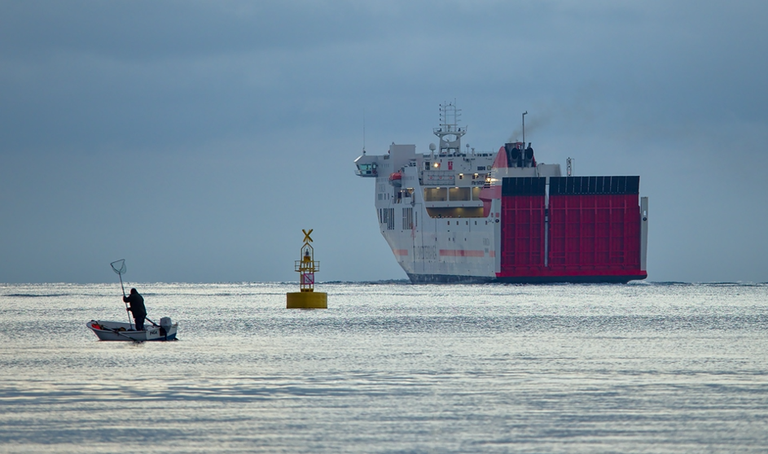
BLUE ECONOMY: A NEW FRONTIER FOR GROWTH AND A HEALTHY MEDITERRANEAN
Major economic activities rely on the Mediterranean marine and maritime base: tourism and recreational activities; fisheries and aquaculture; maritime transport and port activities; bio-prospecting or exploitation of biological resources; ...
Major economic activities rely on the Mediterranean marine and maritime base: tourism and recreational activities; fisheries and aquaculture; maritime transport and port activities; bio-prospecting or exploitation of biological resources; exploitation of energy sources. With 46 000 km of coastline and unique marine resources, the Mediterranean region hosts a Blue Economy with total value estimated at USD 5.6 trillion and generates an annual economic value of USD 450 billion.
These economic activities pose particular threats to the health of the Mediterranean Sea including: i) acidification, sea temperature and level increases, shifts in currents, biodiversity resource and habitat losses, ii) pollution and iii) overfishing and other resource sustainability and efficiency issues.
In this context, a sustainable and inclusive blue economy with low pollution, resource-efficient and circular features can provide a positive contribution to the development of the Mediterranean region.
Blue economy is a major work pillar of Plan Bleu, in particular through the projects Blue Growth Community and Sustainable Tourism Community. In January, Plan Bleu published the report “Blue economy in the Mediterranean: Case studies, lessons and perspectives” and took part in February in the two following events: the First Annual Assembly of the Blue Growth Community (Montpellier, France, 4-5 February 2020), and Euromaritime - the Euromediterranean Blue Growth Exhibition (Marseille, France, 4-6 February 2020).
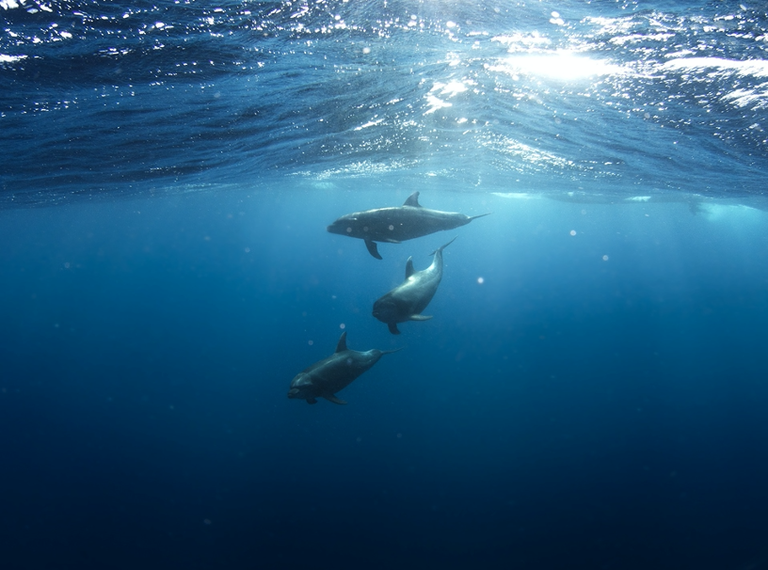
BLUE FINANCE: FUNDING OPPORTUNITIES FOR BLUE ECONOMY PROJECTS
The European Commission is partnering with the European Investment Fund, part of the European Investment Bank Group (EIB), launched a €75 million equity investment fund for the blue economy. The BlueInvest Fund will be managed by the European ...
The European Commission is partnering with the European Investment Fund, part of the European Investment Bank Group (EIB), launched a €75 million equity investment fund for the blue economy. The BlueInvest Fund will be managed by the European Investment Fund and will provide financing to underlying equity funds that strategically target and support the innovative blue economy. This sector can play an important role in the transformation to a carbon-neutral economy by 2050, an ambition announced in the European Green Deal. The new programme is backed by the European Fund for Strategic Investments, the financial pillar of the Investment Plan for Europe.
The blue economy includes economic activities related to oceans, seas and coasts. It ranges from companies in the marine environment to land-based businesses producing goods or services that contribute to the maritime economy. The blue economy harbours many promising early-stage ventures and companies – often emanating from EU-funded R&D programmes. These companies develop solutions for renewable energy, sustainable seafood, blue biotechnology, maritime IT and much more.
The new fund is complemented by the European Commission's BlueInvest platform, which supports investment readiness and access to finance for early-stage businesses, SMEs and scale-ups. Through the European Maritime and Fisheries Fund, the Commission also funds an additional €40 million grant scheme, to help blue economy SMEs with developing and bringing to market new innovative and sustainable products, technologies and services.
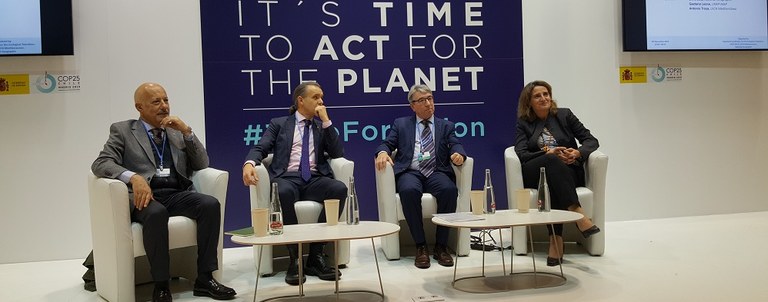
THE MEDITERRANEAN IN THE GLOBAL SPOTLIGHT OF COP25, TWO DAYS AFTER THE CONCLUSION OF THE REGIONAL COP21 OF THE BARCELONA CONVENTION
Two days after the conclusion of COP21 of the Barcelona Convention and its Protocols (Naples, Italy, 2-5 December 2019), Mr Gaetano Leone, UNEP/MAP — Barcelona Convention Secretariat Coordinator participated in a discussion hosted by H.E. Ms. Teresa ...
Two days after the conclusion of COP21 of the Barcelona Convention and its Protocols (Naples, Italy, 2-5 December 2019), Mr Gaetano Leone, UNEP/MAP — Barcelona Convention Secretariat Coordinator participated in a discussion hosted by H.E. Ms. Teresa Ribera, Minister for the Ecological Transition of Spain, and entitled the “Mediterranean Sea and climate change”. The event took place on 9 December 2019 in the context of UNFCCC COP25 in Madrid, Spain.
Referring to the words emphasized by Minister Ribera, namely inclusion and ambition, Mr Leone described the importance of an integrated regional response to climate change. He argued that the MAP – Barcelona Convention system “provides an inclusive framework for regional cooperation to address the multiple challenges posed by climate change, particularly in mainstreaming adaptation into decision-making processes on coastal and marine spatial planning, biodiversity and natural capital, pollution reduction and conservation.”
The Coordinator underscored the three-pronged thrust of the Mediterranean Action Plan covering the institutional, regulatory and implementation aspects of the required climate action in the region.
On the institutional level, the MAP—Barcelona Convention system’s proven convening power, notwithstanding a regional setting fraught with disparities and an undercurrent of often tense geopolitical dynamics, comes with a consistent pattern of effective resource mobilization that continues to unlock significant funds from the GEF and other major international financial institutions.
Last week at COP21, the Contracting Parties to the Barcelona Convention and its Protocols adopted a roadmap for the proposal of a possible designation of the Mediterranean as an Emission Control Area for Sulphur Oxides, in line with the terms of Annex VI of the International Convention for the Prevention of Pollution from Ships (MARPOL). This important development illustrates the MAP-Barcelona Convention system’s ability to mobilize political commitment around an issue as complex as the abatement of emissions in the region.
On the regulatory level, the Mediterranean Action Plan’s legal framework encompasses several important elements of policy responses to climate change. One eloquent example is the legally-binding Integrated Coastal Zone Management Protocol that entered into force in 2011, which includes important aspects related to the strengthening of coastal resilience to climate hazards. The Regional Climate Change Adaptation Framework for the Marine and Coastal Areas (RCCA), which was devised under the impetus of MAP, provides the required strategic approach to increase the resilience of the region’s natural and socioeconomic systems.
Speaking on ambition, Mr Leone said that the MAP-Barcelona Convention system was working on several strategic directions in relation to climate change. He cited the establishment of MedECC, an open and independent international scientific expert network bringing together more than 600 scientists form 35 countries. MedECC is working to consolidate the knowledge base underpinning informed decision-making, and to strengthen the science-policy interface that is a crucial for the articulation of adequate responses to climate change.
On action on the ground -- and at sea--, the MAP-Barcelona Convention system implements projects that are gradually fine-tuning collective methodological approaches such as CLIMAGINE, a MAP methodology aimed at securing the effective participation of stakeholders in devising coastal area management programs. With the recently approved GEF-funded MedProgramme project on climate change and the relevant projects executed by the Regional Activity Centres, the system is contributing to a stronger regional capacity to respond to climate change.
“We will continue to foster partnerships for coastal resilience in the Mediterranean. Mobilizing resources is a central goal for the system, and options for large investments in the Mediterranean are being explored,” Mr Leone observed.
Organized by the General Directorate for the sustainability of the coast and the sea (MITECO) of Spain, the side-event in Madrid included interventions by IUCN Mediterranean and National Geographic.
--------------------------
Photo: From left to right: Mr Gaetano Leone (UNEP/MAP), Mr Enric Sala (National Geographic), Mr Antonio Troya (IUCN- Mediterranean), and H.E. Ms Teresa Ribera, Minister for the Ecological Transition (Spain).
Credits: Ministerio para la Transición Ecológica (Spain) / Itziar Martin Partida
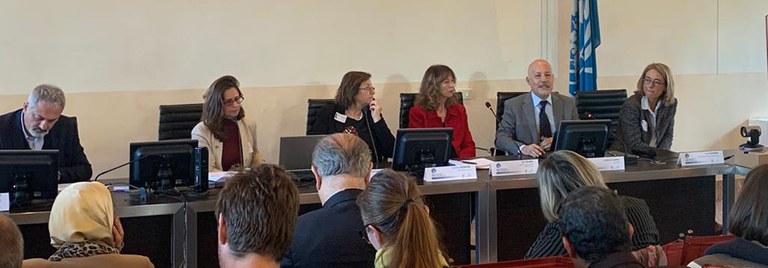
REGIONAL WORKSHOP ARTICULATES THE MEDITERRANEAN CONTRIBUTION TO THE UN DECADE OF OCEAN SCIENCE FOR SUSTAINABLE DEVELOPMENT
On 21-23 January 2020 the Mediterranean Action Plan of the United Nations Environment Programme (UNEP/MAP) joined forces with the Intergovernmental Oceanographic Commission (IOC-UNESCO), the Italian Oceanographic Commission, the European Commission ...
On 21-23 January 2020 the Mediterranean Action Plan of the United Nations Environment Programme (UNEP/MAP) joined forces with the Intergovernmental Oceanographic Commission (IOC-UNESCO), the Italian Oceanographic Commission, the European Commission and the Mediterranean Science Commission to hold a workshop dedicated to the Mediterranean Sea and Coast in the context of preparations for the United Nations Decade of Ocean Science for Sustainable Development (2021-2030).
Building on the outcomes of the first global planning meeting held from 13 -15 May 2019 in Copenhagen, Denmark, the workshop entitled “The Mediterranean Sea We Need for the Future We Want" took place in the IOC-UNESCO office premises in Venice, Italy.
By providing a forum to engage stakeholders and to identify partnerships and concrete steps to meet the Decade's objectives, the workshop was instrumental in articulating the Mediterranean perspective in line with the regional approach that UNEP/MAP – one of the main actors in the field of ocean science in the Mediterranean region – advocates.
“Bearing in mind the key findings of the Global Ocean Science Report, the preparation of the Decade’s Implementation Plan offers an opportunity to establish new cooperation and partnership modalities to facilitate access to data, equipment and know-how transfer, ” the UNEP/MAP – Barcelona Convention Secretariat Coordinator Gaetano Leone said at the opening of the workshop.
In his statement, Mr. Leone outlined ideas and partnership activities that the UNEP/MAP delegation, including representatives of MEDPOL, SPA/RAC, Plan Bleu, PAPA/RAC and INFO /RAC Regional Activity Centres, put forward in in the workshop’s six working groups covering the societal outcomes of the UN Ocean Decade*. The Coordinator also noted the participation of representatives of Contracting Parties to the Barcelona Convention -- both from policy and science communities -- whom UNEP/MAP invited to the workshop.
In their deliberations, participants focused on a set of Mediterranean thematic priorities including bridging knowledge and technology gaps to unlock the Mediterranean Sea potential; consolidating the Mediterranean position as a space for innovation, environmental protection and sustainable development; enhancing cooperation opportunities with a focus on capacity-development and harnessing effective leadership for sound environmental governance.
Participants also addressed the implementation of the Integrated Monitoring and Assessment Programme (IMAP), which was adopted in 2016 by the Contracting Parities to the Barcelona Convention in an endeavor to produce a quantitative integrated analysis of the state of the marine and coastal environment based on common regional indicators, targets and Good Environmental Status descriptions.
“The Decade needs to go beyond scientific capacity development, by creating a new awareness at the policy and civil society level, identifying alternative funding and increasing international collaboration. The Decade must also be a means to harvest innovative ideas towards better understanding of the whole ocean system. Therefore, the effective use of unprecedented achievements in science and technology, is indispensable to ensure that growing development demands and a healthy ocean co-exist in harmony,” Mr Leone noted.
The UN Decade of Ocean Science for Sustainable Development was proclaimed by the General Assembly to pursue two overarching goals: to generate the scientific knowledge and underpinning infrastructure and partnerships needed for sustainable development of the ocean, and to provide ocean science, data and information to inform policies for a well- functioning ocean in support of all Sustainable Development Goals of 2030 Agenda.
Sustainability was high on the agenda of the 21st Meeting of the Contracting Parties to the Barcelona Convention and its Protocols (COP 21). The Contracting Parties adopted the Naples Ministerial Declaration calling for bold action to protect Mediterranean ecosystems, including through the enhancement of a regional science-policy interface enabling the articulation of evidence-based sustainable development policies.
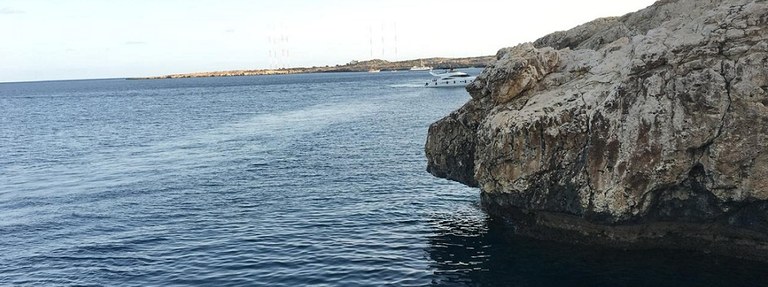
SEMINAR ON PARTICULARLY SENSITIVE SEA AREAS SHEDS LIGHT ON ADDITIONAL OPPORTUNITIES FOR BIODIVERSITY CONSERVATION IN THE MEDITERRANEAN
UNEP/MAP Deputy Coordinator Tatjana Hema and Mr. Khalil Attia, SPA/RAC Director, participated in the Mediterranean Seminar on Particularly Sensitive Sea Areas held in Tirana, Albania, on 12 December 2019.
Left to right: Ms Tatjana Hema, MAP ...
UNEP/MAP Deputy Coordinator Tatjana Hema and Mr. Khalil Attia, SPA/RAC Director, participated in the Mediterranean Seminar on Particularly Sensitive Sea Areas held in Tirana, Albania, on 12 December 2019.
 |
| Left to right: Ms Tatjana Hema, MAP Deputy Coordinator, H.E. Mr. Blendi Klosi, Minister of Tourism and Environment of Albania and Mr. Khalil Attia, SPA/RAC Director |
The seminar, which was opened by H.E. Mr. Blendi Klosi, Minister of Tourism and Environment of Albania, provided representatives of the Contracting Parties to the Barcelona Convention and its Protocols with information and with an opportunity to undertake an in-depth discussion on the procedure for the designation of Particularly Sensitive Sea Areas (PSSA), including criteria and legal aspects in line with IMO guidelines.
Referring to the work undertaken by UNEP/MAP to establish Specially Protected Areas of Mediterranean Importance (SPAMI), marine protected areas and other area-based management measures in the Mediterranean, Deputy Coordinator Tatjana Hema emphasized “the need for considering -- where appropriate -- their completion with measures addressing shipping routes and other measures as need be.” Ms. Hema also said that the meeting brought about a better understanding of opportunities offered by PSSA tools and related IMO guidelines.
Best practices shared by participants from other regions were complemented with training on issues related to PSSA designation and IMO respective regulations and guidelines. The Seminar was followed by a training on Marine Spatial Planning for the Albania team involved in the GEF Adriatic Project.
According to Ms. Hema, exploring additional opportunities for biodiversity conservation in the Mediterranean finds its justification in the alarming state of ecosystems in the region. The State of the Environment and Development Report (SoED 2019), a major publication to be launched in 2020 that was prepared under the coordination of Plan Bleu – the France-based UNEP/MAP Regional Activity Centre–, highlights the fact that the Mediterranean Sea is host to the world’s busiest shipping lanes and is the second busiest cruising region in the world after the Caribbean with 15.8 per cent of global cruise fleet deployment in 2017.
The 1st scientific assessment report about climate and environmental change in the Mediterranean undertaken by the network of Mediterranean Experts on Climate and Environmental Change (MedECC), 34% of fish species are lost due to overfishing. According to SPA/RAC, the UNEP/MAP Regional Activity Centre specializing in biodiversity protection, only 10% of Marine Protected Areas (MPA) are managed in line with the required standards. The Target 14.5 under the Sustainable Development Goal 14 dedicated to the Ocean -- “Conserve at least 10% of marine and coastal areas by 2020” -- was not achieved in the Mediterranean region.
This challenging state of affairs illustrates the importance of the undertaking discussed in Tirana, where the representatives of the Contracting Parties to the Barcelona Convention thrashed out practical aspects related to the possible designation of PSSAs in the Mediterranean. The seminar in Albania is part of UNEP/MAP activities funded by the Ministry for Environment, Land and Sea Protection (IMELS) of Italy and aiming at supporting the identification and planning of Marine Spatial Planning measures.
Considering the multitude of technical issues involved, several UNEP/MAP Regional Activity Centers, namely SPA/RAC, REMPEC and PAP/RAC, are working together under the guidance of the Coordinating Unit to shore up the Contracting Parties’ efforts in area-based conservation measures for the protection of species and habitats and in the sustainable management of marine and coastal resources in the Mediterranean.
The UNEP/MAP Programme of Work for the 2020-2021 biennium adopted at COP21 (Naples, Italy, 2-5 December 2019) includes the elaboration of a post-2020 strategic document on Marine Protected Areas and other effective area-based conservation measures in the Mediterranean, in line with the UNCBD post-2020 global biodiversity framework. In addition, the Contracting Parties to the Barcelona Convention and its Protocols adopted an updated strategy for the conservation of the iconic Monk Seal and updated plans for the conservation of sharks, rays and other cartilaginous fishes. In addition, four new sites were designated as Specially Protected Areas of Mediterranean Importance (SPAMI) in France, Italy, Slovenia and Spain.
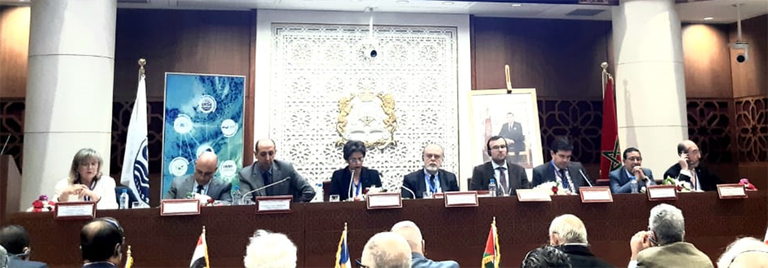
REITERATING THE ROLE OF PARLIAMENTARIANS AND STAKEHOLDERS IN ANCHORING SUSTAINABILITY IN THE MEDITERRANEAN
UNEP/MAP – Barcelona Convention Secretariat Deputy Coordinator Tatjana Hema took part in the 14th meeting of the Circle of Mediterranean Parliamentarians for Sustainable Development (COMPSUD) on 17 December 2019 in Rabat, Morocco. The meeting, which ...
UNEP/MAP – Barcelona Convention Secretariat Deputy Coordinator Tatjana Hema took part in the 14th meeting of the Circle of Mediterranean Parliamentarians for Sustainable Development (COMPSUD) on 17 December 2019 in Rabat, Morocco. The meeting, which the Parliament of the Kingdom of Morocco hosted, agreed to launch of a “Decade of Sustainable Development in the Mediterranean” and on a number of related priority actions.
Inaugurated in 2002, COMPSUD is an initiative of the Mediterranean Information Office for Environment, Culture and Sustainable Development (MIO-ECSDE) – a UNEP/MAP partner – and the Global Water Partnership – Mediterranean (GWP Med). It aims at promoting the role of parliamentarians from EU and non-EU Mediterranean countries in anchoring sustainable development. COMPSUD is member of the MCSD Steering Committee since 2017.
Ms. Hema commended the commitment of the Kingdom of Morocco to sustainable development and to the implementation of the Barcelona Convention and its Protocols, and recalled the institutional, regulatory and implementation pillars upon which the UNEP/MAP-Barcelona Convention system’s mandate rests.
Referring to the MAP mandate, Ms. Hema emphasized the interaction between marine and costal environment and related development issues in the region. She noted that the Mediterranean Strategy for Sustainable Development and other strategic MAP documents support the streamlining of the global agenda for sustainable development, notably the 2030 Agenda and the 17 Sustainable Development Goals, at the regional, sub-regional, national and local levels.
Ms. Hema shared with participants the main findings of the UNEP/MAP- Plan Bleu “State of the Environment and Development Report (SoED 2019)”, which will be published in 2020. The report identifies key economic drivers in the region and expected impacts on marine and coastal environment in the Mediterranean that “call for joint, systemic, innovative, cost-effective, inclusive, participatory and complementary responses”.
Ms. Hema also highlighted the outcomes of the 21st Meeting of the Contracting Parties to the Barcelona Convention, including the Naples Ministerial Declaration, which committed Parties to taking concrete action for enhanced safeguarding of the Mediterranean Sea. She referred to COP21 as “a COP of delivery and “ success.”
The Naples Declaration is not just a policy document, Ms. Hema said, but “a manifesto that puts countries on track to tackling common challenges”. She stressed that ”parliamentarians as national decision makers have an important role in the promotion of high-standard national policies considering environment protection as a right and duty for all, and as messengers of Mediterranean people voices.” She concluded by inviting participants in the meeting to make the Naples Ministerial Declaration their own.
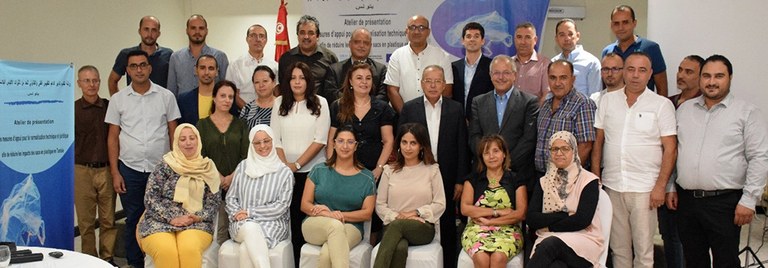
BAN ON SINGLE-USE PLASTIC BAG INTRODUCED IN TUNISIA WITH UNEP/MAP SUPPORT
UNEP/MAP was instrumental in the introduction of a ban on single-use plastic bags in Tunisia.
The ban, which entered into force on 1 March 2020 for supermarkets by virtue of Decree No. 32 dated 16 January 2020, prohibits the manufacturing, import ...
UNEP/MAP was instrumental in the introduction of a ban on single-use plastic bags in Tunisia.
The ban, which entered into force on 1 March 2020 for supermarkets by virtue of Decree No. 32 dated 16 January 2020, prohibits the manufacturing, import and use of conventional single-use plastic bags.
Compostable and reusable plastic bags will still be allowed in the market as an alternative, provided that they bear a specific marking. A comprehensive ban will be extended to all producers and suppliers of plastic bags by 1 January 2021.
Partner Tunisian institutions received technical support in the preparation of the draft decree on aspects such as limitations of compostable bags to prevent plastic leakage.
Funded by the EU and implemented by UNEP/MAP, the Marine Litter MED project also supported the elaboration of the legal and technical framework required for enforcement, including through the revision of industrial norms regulating plastic bag manufacturing.
Given the crucial importance of buy-in from the private sector, the project built on a voluntary agreement that was in place between the Government of Tunisia and supermarkets and pharmacies to encourage an inclusive dialogue on the scope and content of the decree and on sustainable alternatives for industry actors.
The project’s delivery in Tunisia and other Mediterranean countries fed in the elaboration of the Guidelines to phase out single-use plastic bags in the Mediterranean, recently adopted at COP 21. A Regional Cooperation Platform was also established to provide coordinated support and guidance to the implementation of the Regional Plan on Marine Litter Management in the Mediterranean.
The delivery of the Marine Litter MED project encompassed substantial inputs from related regional processes, including UNEP Global Partnership for Marine Litter, the European Union (EU) Marine Strategy Framework Directive (MSFD), the UfM H2020 initiative for a cleaner Mediterranean and the SwitchMed Programme.
Photo credits: SCP/RAC
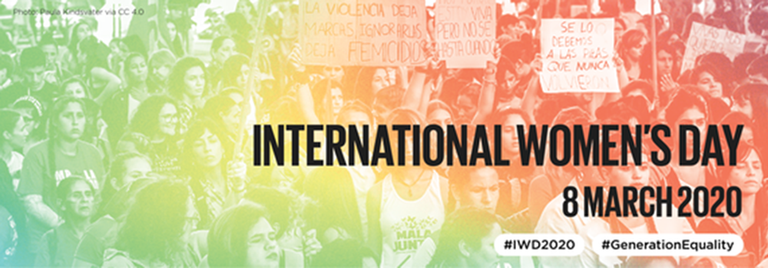
CELEBRATING WOMEN’S CONTRIBUTIONS TO A HEALTHY MEDITERRANEAN
Women at the helm of green entrepreneurship in the Mediterranean
Under the auspices of UNEP/MAP, the Contracting Parties to the Barcelona Convention adopted in 2016 a Sustainable Consumption and Production Action Plan for the Mediterranean ...
Women at the helm of green entrepreneurship in the Mediterranean
Under the auspices of UNEP/MAP, the Contracting Parties to the Barcelona Convention adopted in 2016 a Sustainable Consumption and Production Action Plan for the Mediterranean region.The UNEP/MAP’s Regional Activity Centre for Sustainable Consumption and Production (SCP/RAC) provides support to Contracting Parties in its implementation, including through the Switchmed programme.
Switchmed is an initiative aiming to scale up social and eco-innovations in the Mediterranean through training to green business entrepreneurs and advocacy for a policy and regulatory framework conducive to innovation. The programme is implemented through a collaboration among UNEP/MAP – through SCP/RAC –, UNEP Economy Division and the EU (DG NEAR).
The SwitchMed Programme fosters women’s participation in economic life by promoting the creation of new business models and green jobs through the training and support of women entrepreneurs, the provision of services for women business development, networking activities and the facilitation of access to financing for women.
Women represent 38% of the Switchers, a community of inspiring green entrepreneurs and change makers in the Mediterranean region. In line with a methodology created by SCP/RAC, 21 women were among 48 green entrepreneurs selected to benefit from a cycle of mentoring and technical backstopping for the development of their businesses.
In Morocco, the SwitchMed Programme worked with women cooperatives located in the Oriental region of Morocco closely through the Association du Docteur Fatiha, as part of a pilot project implemented to prevent most common plastic marine litter in the Mediterranean Sea. While creating new jobs for many women, the association contributed to safeguard handcraft heritage and the environment by producing and testing different durable carrier bags.
The Switchers’s platform offered opportunities to women green entrepreneurs from around the Mediterranean to share their stories of change towards sustainable consumption and production.
- Lebanon - Bushra Harakeh started Zoap, a thriving manufacturer of recycled soaps; Aya Hoteit established CIVVIES an eco-friendly Lebanese clothing label, to address wasteful shopping habits.
- France -- Camille Jaillant is the creative director of Olistic Label France, which makes high-end wedding and evening dresses with organic-certified textiles.
- Tunisia – Wahiba Ben Ali is the Marketing Director of ArtisaNature, an online sales platform for Tunisian products that are organic, fair trade, artisanal or handmade.
Women at the center of an eco-tourism circuit in Kneiss Islands in Tunisia

The Specially Protected Areas of Mediterranean Importance (SPAMI) Twinning Programme implemented by the UNEP/MAP Regional Activity Centre for Specially Protected Areas (SPA/RAC) supported the Association de Continuité des Générations (ACG), a non-governmental organization and a member of the UNEP/MAP Partnersnetwork, to set up an eco-tourism circuit in the Kneiss Islands, a marine protected area off the coast of Sfax, 300 km south of the capital Tunis.
The circuit was developed in consultation with local authorities and other stakeholders. It highlights the role of women in the sustainable harvesting of clam and showcases environment-friendly income-generating activities.
Attractions on the circuit include "Kib", a typical local construction built by women with support from the SPAMI Twinning Programme, and an area where women farmers from the region can exhibit and sell local products such as the “Khawala” grapes, olive oil, traditional "Tabouna" bread, and a range of handicraft products.
ACG played a key role in the empowerment of the women collectors as part of a project led by FAO. The NGO also worked with women on the preservation of marine biodiversity in the Kneiss Islands, and launched projects promoting the role of “rural women as an actor of sustainable development in their region" ; "enabling women to benefit from more equal agri-food value chains ", and supporting women entrepreneurs in the fishing sector in the Gargour area near the city of Sfax.
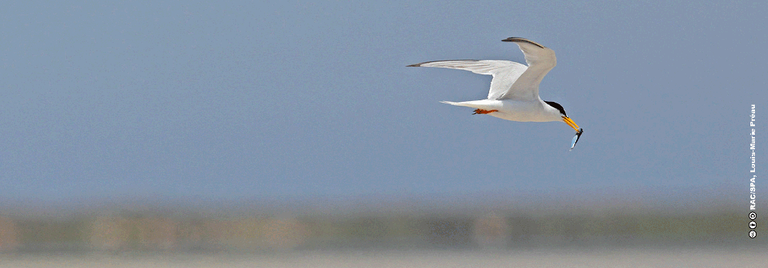
THERE CAN BE NO HEALTHY MEDITERRANEAN WITHOUT A THRIVING WILDLIFE
World Wildlife Day (3 March) is an opportunity to beat the drum for the fauna and flora of the Mediterranean because they deserve all the attention that they can get. Unsustainable human activities and overexploitation of natural resources have ...
World Wildlife Day (3 March) is an opportunity to beat the drum for the fauna and flora of the Mediterranean because they deserve all the attention that they can get. Unsustainable human activities and overexploitation of natural resources have taken a hefty toll on biodiversity in Mare Nostrum.
According to the 2018 State of World Fisheries and Aquaculture (SOFIA) report, published by the Food and Agriculture Organization of the United Nations (FAO), the Mediterranean Sea is the most overfished in the world: 62% of its fish stocks are overfished and at risk of being depleted. Inadequate fishing practices are also causing tragic biodiversity loss in other ways. Dolphins, turtles, seals and other endangered species perish when they are trapped in “ghost gear”—lost or discarded fishing equipment such as nets and longlines that may take up to 600 years to breakdown.
Ghost gear is one of the facets of the marine litter problem that threatens wildlife in the Mediterranean. With 210 million inhabitants living in coastal areas and 320 million tourists visiting each year, plastic pollution has reached alarming levels. It is estimated that up to 80 per cent of marine turtles are affected by litter in certain areas around the Mediterranean.
Marine vegetation has not been spared. Posidonia Oceanica Meadows – also known as the lungs of the Mediterranean, because it constitutes one of the most important sources of oxygen in coastal waters – is on the decline. A study conducted in 2015 (Telesca, L. et al.) revealed that the regression of meadows amounted to an estimated 34 per cent in the last 50 years due to “the cumulative effects of multiple local stressors”.
Under the auspices of UNEP/MAP, the Contracting Parties to the Barcelona Convention and its Protocol concerning Specially Protected Areas and Biological Diversity have adopted several Regional Action Plans to safeguard marine and coastal fauna and flora. Significant progress has been made in the development of a comprehensive regulatory framework safeguarding Mediterranean Biodiversity. The UNEP/MAP Regional Activity Centre for Specially Protected Areas (SPA/RAC) continues to enhance the collective body of knowledge and technical expertise available for action.
Regional Action Plans and Strategies based on the best available scientific and technical knowledge have been devised to protect endangered species and threatened habitats. The Strategic Action Programme for the Conservation of Biological Diversity in the Mediterranean Region (SAP BIO) constitutes the main instrument for regional cooperation to halt biodiversity loss in Mare Nostrum.
This endeavor has resulted in undeniable gains for Mediterranean wildlife but gaps in the enforcement of legal obligations undertaken by the Contracting Parties under the Barcelona Convention has stalled progress.
The 21st Meeting of the Contracting Parties to the Barcelona Convention and its Protocols (COP21, Naples, 2-5 December 2019) recently adopted a batch of decisions on biodiversity conservation. Four new sites were designated as “Specially Protected Areas of Mediterranean Importance (SPAMI)” in France, Italy, Slovenia and Spain. Based on the findings of a recent evaluation of the implementation of the Strategic Action Programme for the Conservation of Biological Diversity in the Mediterranean Region (SAP BIO), the Contracting Parties updated strategies and plans for the conservation of iconic Mediterranean species, including the Mediterranean monk seal.
The Mediterranean monk seal is one of the world’s most endangered marine mammals. Most people living in the Mediterranean today probably have never seen a monk seal in its natural habitat. “monk seal recovery in the Mediterranean is still possible,” according to Khalil Attia, the Director of SPA/RAC. “But for this to work, we will need determination and unfaltering commitment on the part of governments,” he added.
The extinction of this iconic mammal would hit conservation efforts hard. “We cannot afford to let the monk seal go. The symbolism of such an occurrence would go beyond the species group itself to cast a grim cloud over conservation efforts in the Mediterranean and beyond,” said Gaetano Leone, the UNEP/MAP—Barcelona Convention Secretariat Coordinator.
In the super year for nature and biodiversity, progress in the implementation of the updated strategies on monk seal, sharks and cartilaginous fishes under the Barcelona Convention will demonstrate the Contracting Parties’ commitment to the spirit of the Naples Ministerial Declaration in which they describe 2020 as a “critical turning point for the conservation and sustainable management of the Mediterranean Sea and coast” and underscore the “need for a systemic change supported by forward-looking and innovative strategies, policies, and behaviors”.
On World Wildlife Day, let the endearing image of the Mediterranean monk seal remind us of the need for bold action to protect Mediterranean biodiversity for our own sake, because there can be no healthy Mediterranean without a thriving wildlife.
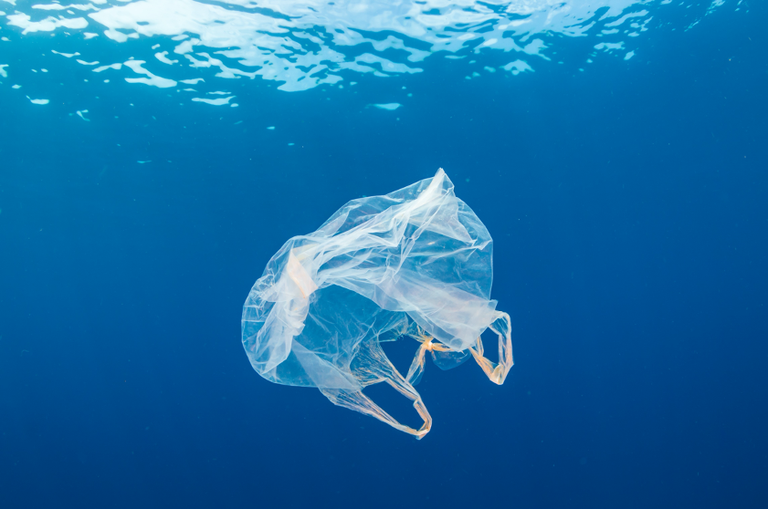
SCP/RAC supports five Mediterranean countries in curbing single-use plastic waste
- SCP/RAC provided technical assistance to the governments of Tunisia, Egypt and Lebanon on phasing out single-use plastic bags, and to Morocco and Algeria in implementing extended producer responsibility to plastic packaging.
- Four national ...
- SCP/RAC provided technical assistance to the governments of Tunisia, Egypt and Lebanon on phasing out single-use plastic bags, and to Morocco and Algeria in implementing extended producer responsibility to plastic packaging.
- Four national events were held to explain and enrich the results, as well as gaining engagement for the next steps of implementation.
- This work allowed countries to fulfil their obligations in the implementation of the Barcelona Convention Regional Plan on Marine Litter Management in the Mediterranean.
- The activities are framed within the Marine Litter Med project, funded by the EU.
SCP/RAC has worked over the last 3 years in providing support to non-EU countries in implementing measures against marine litter, particularly addressing single-use plastic bags and food and beverage packaging through extended producer responsibility (EPR). Through a consultation phase, Tunisia, Egypt, Lebanon, Morocco and Algeria expressed willingness to receive support from SCP/RAC.

THE MEDITERRANEAN REGION IS A CLIMATE CHANGE HOTSPOT
Warming 20% faster than the rest of the globe, the Mediterranean region is recognized as a climate change hot spot. Without strong mitigation policies, the regional temperature increase will reach 2.2°C in 2040, possibly exceeding 3.8°C in some ...
Warming 20% faster than the rest of the globe, the Mediterranean region is recognized as a climate change hot spot. Without strong mitigation policies, the regional temperature increase will reach 2.2°C in 2040, possibly exceeding 3.8°C in some parts of the region in 2100.
Record-high temperatures, more severe droughts, flooding and other extreme events, sea-level rise, ocean acidification and declining biodiversity exacerbate existing environmental issues in the Mediterranean Basin caused by the combination of changes in land use, pollution and overexploitation of natural resources.
Climate change triggers important risks for Mediterranean ecosystems (forests, wetlands, coastal and marine ecosystems) that provide numerous services, including human security and well-being.
Fresh water availability in the Mediterranean region is likely to undergo one of the highest rates of decrease in the world. An already water-stressed Mediterranean population is projected to increase from 180 million people in 2013 to over 250 million within 20 years.
Important Mediterranean sectors, including tourism, aquaculture, fisheries and forestry already suffer the impacts of climate change. By 2050, cities in the Mediterranean will account for half of the 20 global cities with the highest increase of the average annual damages.
All these crucial issues will be addressed in the 1st scientific assessment report about climate and environment change in the Mediterranean that will be soon published by the Network of Mediterranean Experts on Climate and Environmental Change (MedECC). Plan Bleu as a Regional Activity Centre of UNEP/MAP accompanies MedECC with the support of the Government of the Principality of Monaco since 2016, has hosted MedECC scientific secretariat since May 2018.
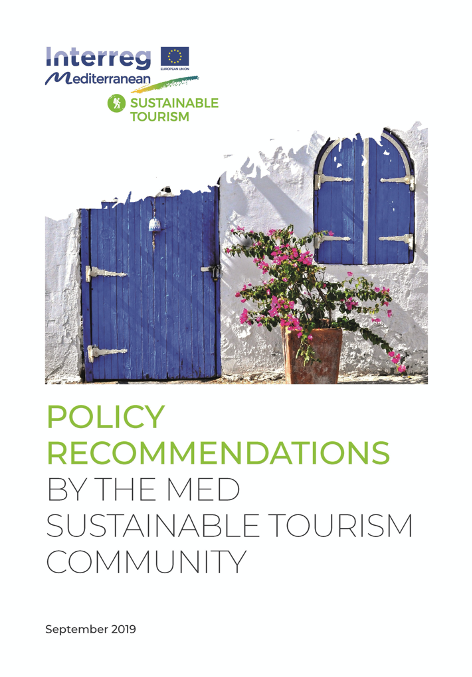
POLICY RECOMMENDATIONS BY THE MED SUSTAINABLE TOURISM COMMUNITY
Plan Bleu is partner of the MED Sustainable Tourism Community, a transnational partnership of 18 sustainable tourism projects funded by the Interreg MED Programme.
The Community, which aims to move towards sustainable coastal and maritime ...
Plan Bleu is partner of the MED Sustainable Tourism Community, a transnational partnership of 18 sustainable tourism projects funded by the Interreg MED Programme.
The Community, which aims to move towards sustainable coastal and maritime tourism by capitalising on project results and lessons learned, has identified in its Policy Recommendations the four most urgent action areas: monitor sustainability: where are the knowledge gaps in tourism policy-making? What is the best way to bridge the gaps in tourism data?; reduce the environmental, cultural and social impacts of Mediterranean tourism ; ensure sustainable and responsible economic growth and prosperity in the Mediterranean through tourism: What is the best way to address the complexity of the tourism sector, including local actors, decision-makers and consumers?; establish governance mechanisms that lead the wide variety of stakeholders towards more sustainable, more responsible tourism.
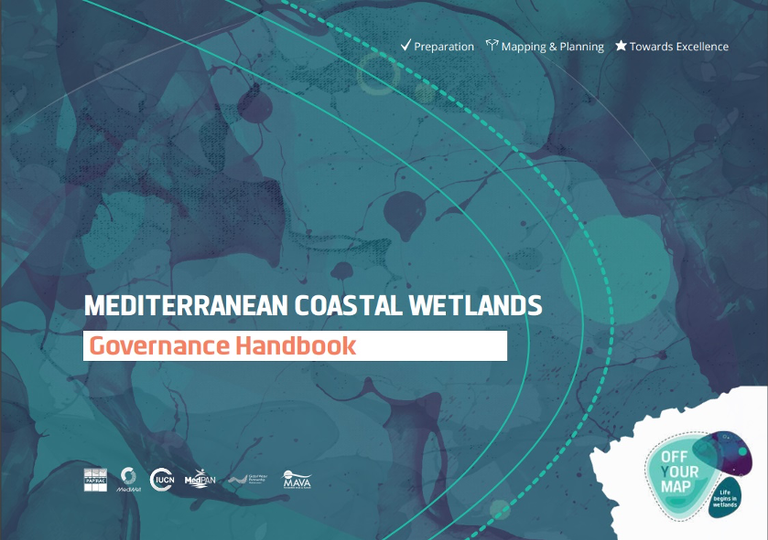
NEW PUBLICATION: “THE GOVERNANCE OF COASTAL WETLANDS IN THE MEDITERRANEAN: A HANDBOOK”
The Governance of Coastal Wetlands in the Mediterranean – a Handbook”, is designed as a practical guide for the governance of coastal wetlands around the Mediterranean, whether they are formally protected as Ramsar Sites, under national or local ...
The Governance of Coastal Wetlands in the Mediterranean – a Handbook”, is designed as a practical guide for the governance of coastal wetlands around the Mediterranean, whether they are formally protected as Ramsar Sites, under national or local legislation, or lacking any formal protection. It takes into account the principles and practice of Integrated Coastal Zone Management (ICZM), Integrated Water Resources Management (IWRM), and the tools offered by the two relevant conventions, namely the Ramsar Convention on Wetlands and the Barcelona Convention. The Handbook also contains link to on-line planning tools to help design efficient governance models.
The Handbook has been developed as part of the overarching initiative of the MAVA Foundation ‘Coastal Wetland Action Plan’. Its preparation was initiated by the Priority Actions Programme Regional Activity Centre (PAP/RAC), coordinated and published under its leadership. It was supported by the International Union for Conservation of Nature (IUCN) and the MAVA Foundation for Nature, and enjoyed valuable contributions by the Mediterranean Wetlands Initiative (MedWet), the IUCN Regional Office for Eastern Europe and Central Asia (IUCN ECARO), the Global Water Partnership-Mediterranean (GWP-Med) and the Network of Marine Protected Areas Managers in the Mediterranean (MedPan).
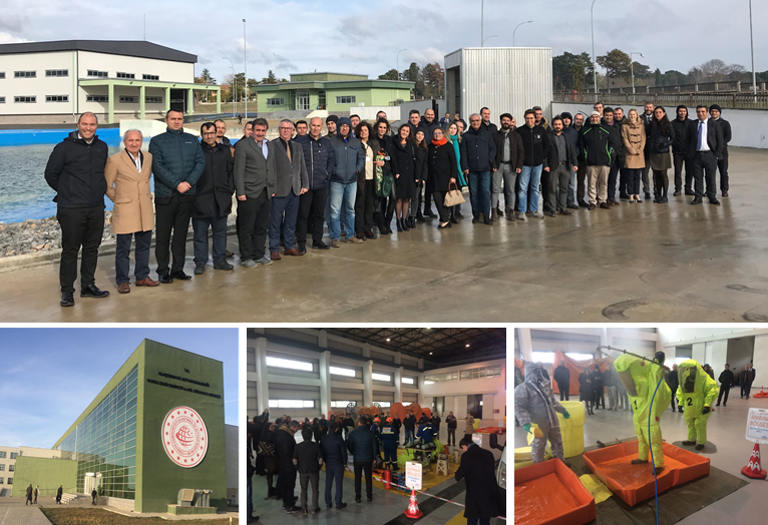
PREPAREDNESS AND RESPONSE TO HAZARDOUS AND NOXIOUS SUBSTANCE SPILLS
With the rise of transport by sea of chemicals and gases (both in bulk and containerized), proper preparedness for response to potential spill incidents involving hazardous and noxious substances (HNS) is increasingly important.
In this ...
With the rise of transport by sea of chemicals and gases (both in bulk and containerized), proper preparedness for response to potential spill incidents involving hazardous and noxious substances (HNS) is increasingly important.
In this perspective, the Regional Marine Pollution Emergency Response Centre for the Mediterranean Sea (REMPEC), a Regional Activity Centre of UNEP/MAP, administrated by the International Maritime Organization (IMO), joined forces with the European Maritime Safety Agency (EMSA) to organize a National training course on the response to HNS in the marine environment (Manager Level), in Tekirdağ, Turkey from 3 to 5 December 2019.
The workshop brought together over 50 response managers from the public and private sectors to examine considerations and challenges in responding to HNS incidents occurring in national waters.
The workshop was based on the OPRC-HNS Model Training Courses which has been developed to assist IMO Member States in their efforts to build national capacity in preparing for and responding to HNS incidents, in line with the OPRC-HNS Protocol.
The OPRC-HNS Protocol aims to establish national systems for preparedness and response and to provide a global framework for international co-operation in combating major incidents or threats of marine pollution.
The training was hosted by the Government of Turkey and was held on the premises of the recently inaugurated National Maritime Safety and Emergency Response Centre (UDEM), and co-funded by the IMO's Integrated Technical Cooperation Programme, REMPEC's Mediterranean Trust Fund (MTF) as well as from the European Commission's Directorate-General for Neighborhood and Enlargement Negotiations.

16TH INTER-SECRETARIAT MEETING BETWEEN REGIONAL AGREEMENT SECRETARIATSIS HELD IN BRUSSELS, BELGIUM
The Regional Marine Pollution Emergency Response Centre for the Mediterranean Sea (REMPEC) explores the establishment of synergies and cooperation in the field of prevention for and response to marine pollution from ships, with Regional Agreement ...
The Regional Marine Pollution Emergency Response Centre for the Mediterranean Sea (REMPEC) explores the establishment of synergies and cooperation in the field of prevention for and response to marine pollution from ships, with Regional Agreement Secretariats (Bonn Agreement, Copenhagen Agreement, Lisbon Agreement, HELCOM), the Directorate-General for European Civil Protection and Humanitarian Aid Operations (DG ECHO) and the European Maritime Safety Agency (EMSA), during the 16th Inter-Secretariat meeting held on 5 February, in Brussels.
The ongoing development of the Inter-regional HNS Response Manual, in cooperation with the Bonn Agreement, HELCOM and REMPEC, in the framework of the EU-funded West MOPoCo Project, resulting from discussions held within previous Inter-Secretariat Meetings, is a concrete example of a collaborative approach to address common challenges and goals.
Building on ongoing developments within Regional Agreements, DG ECHO and EMSA, potential areas of cooperation and best practices were addressed and presented during the meeting, including pollution reporting format, exercise planning and assessment, the use of the Manual and Tool to Evaluate Oil Spill Management Capabilities (RETOS), the implementation of the Road Map for a Proposal for the Possible Designation of the Mediterranean Sea, as a whole, as a SOx ECA, within the Framework of the Barcelona Convention, as well as the preparation of the Post-2021 Mediterranean Strategy for Prevention of and Response to Marine Pollution from Ships.
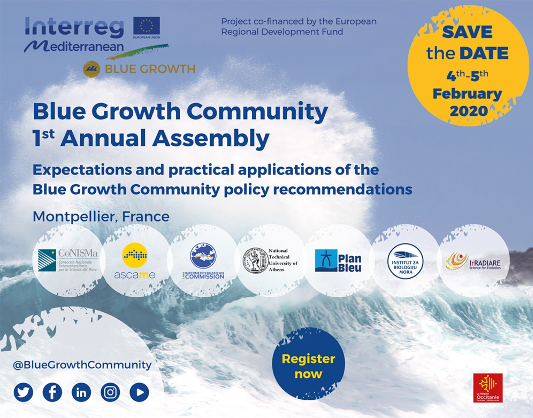
FIRST ANNUAL ASSEMBLY OF THE BLUE GROWTH COMMUNITY
The Blue Growth Community of which Plan Bleu is partner, organised in Montpellier, France, on 4-5 February 2020, its First Annual Assembly event. Following its first three years of implementation, the project now has a new members.(IrRADIARE). The ...
The Blue Growth Community of which Plan Bleu is partner, organised in Montpellier, France, on 4-5 February 2020, its First Annual Assembly event. Following its first three years of implementation, the project now has a new members.(IrRADIARE). The Community will keep building its reflections towards the implementation of a sustainable blue economy in the Mediterranean, strengthening its links with multi-level key actors of blue sectors and seeking more integration with other communities to reach cross-cutting results to tackle common challenges. During the event, the Blue Growth Community considered the seven key policy recommendations included in the Policy Paper on the blue economy in the Mediterranean, and explored practical applications and perspectives in the regional context. A specific focus was placed on Mediterranean initiatives and frameworks working on blue sustainability, the regional dimension, smart specialization strategies and the mainstreaming of community results into the different levels of policy-making actors.
THE CIRCULAR ECONOMY IN ACTION IN THE MEDITERRANEAN
At COP21 in Napoli (2-5 December 2019), SCP/RAC, through the SwitchMed Programme, presented an exhibition that showcases the success stories of small and medium sized enterprises and entrepreneurs that implement circular economy principles in the ...
At COP21 in Napoli (2-5 December 2019), SCP/RAC, through the SwitchMed Programme, presented an exhibition that showcases the success stories of small and medium sized enterprises and entrepreneurs that implement circular economy principles in the Southern Mediterranean countries.
The exhibition was held together 2 exhibitions that offer an articulated path that invites the visitor to learn about Biodiversity, Circular Economy and Marine Litter. It revolves around the main principles of the circular economy such as resource efficient and cleaner production, eco-design practices, reduce-reuse-recycle (3R) strategies, service based business models. The exhibition invites the COP21 participants to read inspiring stories of change agents from the Southern Mediterranean, who are implementing sustainable consumption and production practices.
All of the protagonists of these success stories, coming from 8 countries -- namely Algeria, Egypt, Israel, Jordan, Lebanon, Morocco, Palestine and Tunisia -- are beneficiaries of the SwitchMed Program, who have turned environmental challenges into opportunities. The success stories that can be seen range from recycling single-use plastic bags in order to turn them into stylish purses, to improvements in the eco-design of couscous packaging, to the valorization of downgraded dates. The exhibition also aims at emphasizing best practices and inspiring others to switch to sustainable consumption and production practices.
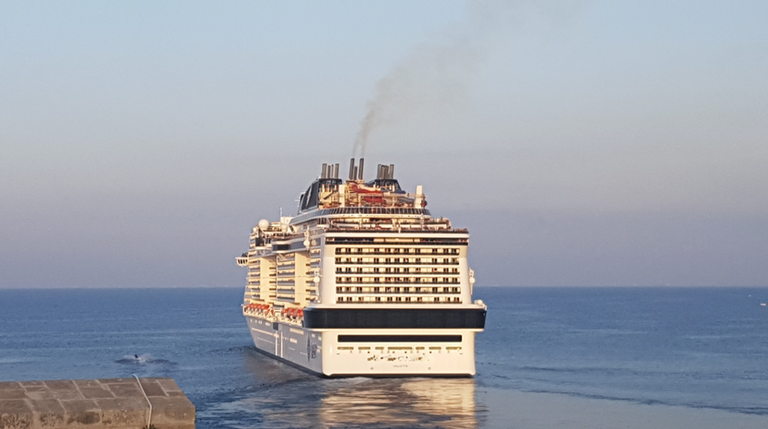
TOWARDS A LOW-SULPHUR FUTURE IN THE MEDITERRANEAN
Recognising the importance of air pollution as new environmental issue, the Contracting Parties to the Barcelona Convention adopted at COP 21 a roadmap developed in 2019 by REMPECoutlining concrete steps towards the possible future designation of ...
Recognising the importance of air pollution as new environmental issue, the Contracting Parties to the Barcelona Convention adopted at COP 21 a roadmap developed in 2019 by REMPECoutlining concrete steps towards the possible future designation of the Mediterranean Sea, as a whole, as an Emission Control Area (Med ECA) for sulphur oxides (SOx) pursuant to MARPOL Annex VI, within the framework of the Barcelona Convention.
The roadmap was prepared on the basis of a technical and feasibility study to examine the possibility of designating the proposed Med ECA carried out by REMPEC between 2018 and 2019, which shows that setting a cap on sulphur content in ships fuel oil at 0.10% in the Mediterranean region would not only improve the environment by lowering the acidification of the water but also benefit the health of the inhabitants by reducing lung cancer and cardiovascular disease mortality and morbidity in the region.
Following the adoption of the roadmap, REMPEC has started taking concrete steps to prepare for the necessary knowledge gathering and further studies (e.g. economic impact, fuel supply and technology analyses, etc.), which will be carried out in a methodological approach and foreseen by the Technical Committee. The ongoing work aims at addressing all the criteria and procedures for designation of emission control areas laid down in Appendix III to MARPOL Annex VI. The work will build on the previous efforts made in the region to tackle ship emissions and will allow REMPEC to finalise a draft proposal to IMO for the designation of the proposed Med SOx ECA which is expected to be submitted to COP 22 in December 2021 for consideration and adoption.
As part of the implementation of the COP 21 decision on the roadmap, REMPEC plans to continue assisting the Contracting Parties to the Barcelona Convention in the ratification and effective implementation of MARPOL Annex VI, by means of the organisation of workshops in Algeria, Lebanon and Egypt.
Since 1 January 2020, the new IMO sulphur cap has come into force, cutting the limit for sulphur content in ships' fuel oil to 0.50% from 3.50%. The proposed Med ECA, which imposes a stricter 0.1% limit on the sulphur content, would lower emissions by 78.7% for SOx and 23.7% for PM2.5, when comparing to the expected emissions of the relevant pollutants in the scenario where only the IMO sulphur cap (0.5%) is in place.
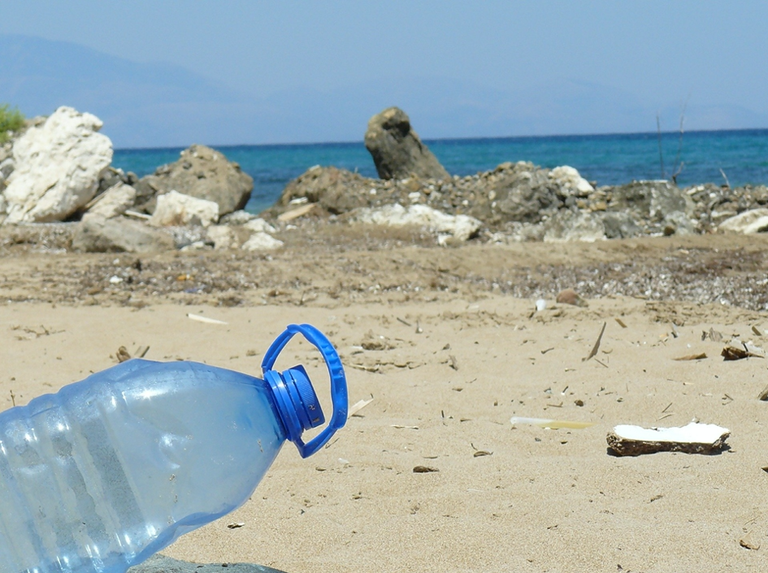
A NEW DRIVE TO TACKLE MARINE LITTER FROM SHIPS
COP21 adopted new guidelines on the Provision of Reception Facilities in Ports and the Delivery of Ship-Generated Wastes and the Application of Charges at Reasonable Costs for the Use of Port Reception Facilities. These guidelines,developed by ...
COP21 adopted new guidelines on the Provision of Reception Facilities in Ports and the Delivery of Ship-Generated Wastes and the Application of Charges at Reasonable Costs for the Use of Port Reception Facilities. These guidelines,developed by REMPEC, aim at tackling the sea-based marine litter with a focus on port reception facilities in ports and marinas.
These tools build on the experience REMPEC has gained by coordinating and carrying out a series of activities under the Marine Litter-MED project (2016-2019) and the Cooperation Agreement between the Italian Ministry of Environment, Land and Sea (IMELS) and the United Nations Environment Programme (UNEP) including the preparation of targeted studies. The application of these guidelines in ports and marina could contribute to lowering the likelihood of waste being ingested by marine life, as well as the risk of being eventually consumed by human beings through the food chain.
With the purpose of improving the management of marine litter from sea-based sources in the ports and marinas, a total of 14 pilots were implemented in the relevant beneficiary countries in southern Mediterranean and the Adriatic Sea region.
Lessons learnt from these pilots were discussed in a sub-regional meeting organised by REMPEC in January 2020 leading to the adoption of a set of recommendations and conclusions, including future steps to strengthen the sub-regional cooperation by exploring ways to harmonise specific measures that would address the issue of marine litter in a more effective and coordinated approach and improve the capacity of relevant countries to better manage ship generated waste at the national and sub-regional level.
To pursue these efforts in the region, REMPEC is currently planning a national activity in Lebanon and under the leadership of UNEP/MAP, national pilots and meetings will be carried out in ports and marinas of other Contracting Parties that have expressed interests or needs. In this context, UNEP/MAP, IMO and REMPEC will continue exploring and establishing synergies between the Regional Plan on Marine Litter Management in the Mediterranean and the IMO Action Plan to address marine plastic litter from ships.
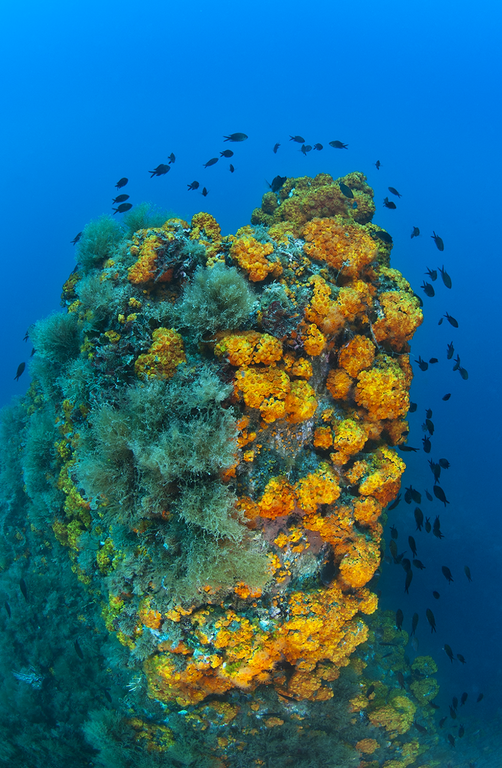
PHOTOGRAPHIC EXHIBITION ON KEY MARINE HABITATS IN THE MEDITERRANEAN SEA
There is in the sea the equivalent of trees and forests, these are the Posidonia meadows and brown seaweed forests. They have the particularity of being inhabitable andedible by a great variety of organisms. In the sea, there is also the equivalent ...
There is in the sea the equivalent of trees and forests, these are the Posidonia meadows and brown seaweed forests. They have the particularity of being inhabitable andedible by a great variety of organisms. In the sea, there is also the equivalent of the buildings in our cities, the organic, living and often complex constructions called coralligenous, which also shelter myriad species.
These habitats bring life and support it, both underwater and on land. They have a direct impact on the physical environment and play a role in natural phenomena that affect the whole planet.
Marine habitats must be studied in order for protection efforts to be based on knowledge. It all starts with observation, questioning and research.
The exhibition on key marine habitats in the Mediterranean, produced by SPA/RAC, shows through the lens of two photographers and biologists, Renaud Dupuy de la Grandrive and Mathieu Foulquié, the beauty and fragility of the marine world, with a focus on Posidonia meadows and coralligenous.
The photos, 75 in all, were taken in different Mediterranean countries (Albania, Algeria, Croatia, France, Greece, Libya, Monaco, Morocco, Spain, Syria, Turkey), from the surface of the sea to more than 30 meters deep.
